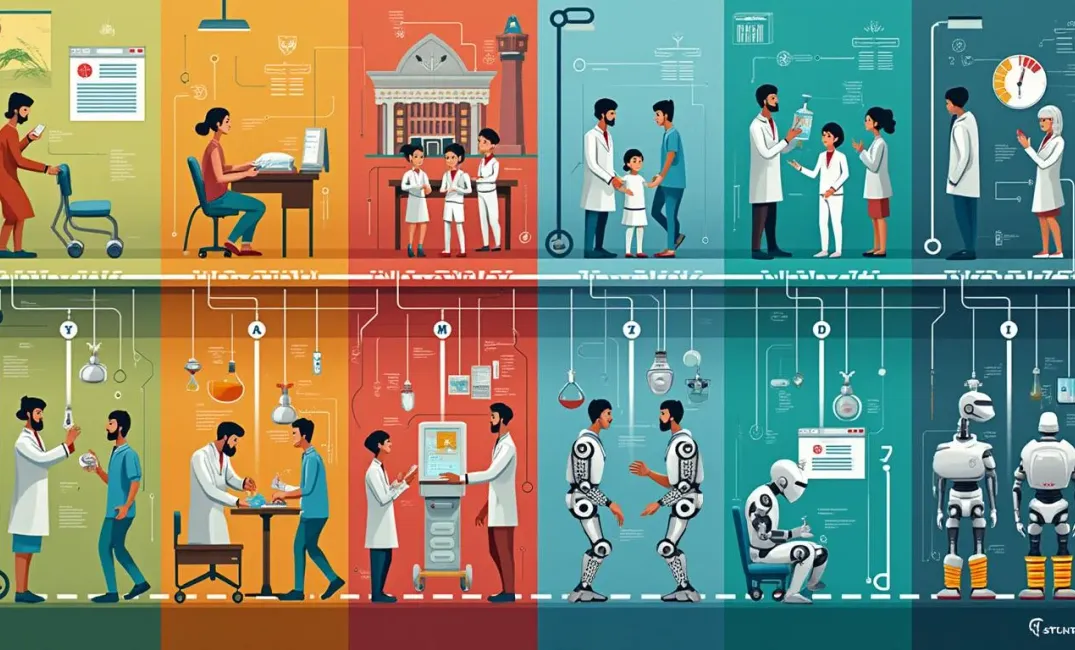Introduction: The Overture of Human Health
"Health is not valued till sickness comes." — Thomas Fuller
Health, a cornerstone of human existence, influences every aspect of life from individual well-being to grand societal shifts. Human health is a dynamic symphony, evolving alongside humanity's journey from ancient herbal remedies to modern medical marvels and future prospects in genetic engineering and artificial intelligence. This exploration delves into the historical context, current challenges, and innovative future of human health, weaving a narrative that highlights resilience, ingenuity, and the quest for a healthier global society.
Ancient Practices: Foundations of Healing
Natural Remedies and Herbal Medicine
- Early Evidence: Ancient cultures, including those in Egypt, India, and China, laid the groundwork for medicine with remedies based on plants and animal parts. Manuscripts like the Ebers Papyrus reveal thousands of years of medicinal knowledge.
- Ayurveda and Traditional Chinese Medicine: Systems like Ayurveda and TCM have stood the test of time, emphasizing balance and holistic approaches. These early practices focused on the interplay between body, mind, and spirit, influencing modern integrative medicine.
Spiritual and Ritualistic Healing
- Shamanistic Traditions: Ancient shamanistic rituals emphasized spiritual healing, engaging community beliefs and practices to address illness, transcending mere physical ailments.
- Healing Temples and Asclepions: In Ancient Greece, temples dedicated to Asclepius were centers for healing rituals combining prayer, rest, and dream interpretation, highlighting the ancient interface of faith and medicine.
Medieval and Renaissance Medicine: Scarcity and Discovery
The Middle Ages: From Superstitions to Science
- Medicinal Monasteries: Monks preserved and expanded medical knowledge during Europe's Dark Ages, maintaining fragile links to Greek and Roman traditions.
- Health Crusades: Epidemics like the Black Death triggered health crusades, prompting cities to adopt public health measures such as quarantines and sanitary regulations—early battles in organized disease response.
Renaissance Enlightenment
- Medical Renaissance Figures: Innovators like Andreas Vesalius refined anatomy with detailed human dissections, while Paracelsus revolutionized pharmacology by introducing chemically prepared drugs.
- Surgical Advancements: Understanding of human anatomy surged, enabling revolutionary surgical techniques, such as those pioneered by Ambroise Paré, who championed gentle wound treatment over cauterization.
The Dawn of Modern Medicine: From Germ Theories to Genetic Codes
Eugenics, Ethics, and Vaccination
- Breakthroughs in Bacteriology: In the 19th century, figures like Louis Pasteur and Robert Koch unlocked germ theory, establishing that germs cause disease, leading to vaccinations that tackled deadly diseases such as smallpox.
- Eugenics Debates: The early 20th-century eugenics movement spurred ethical debates that echo through genetic engineering discussions today, challenging humanity to consider the morality of manipulating genetic heritage.
Technological Integration and Biomedicine
- Medical Imaging Innovations: Technologies like X-rays and MRIs revolutionized diagnostic capabilities, allowing detailed internal assessments without invasive procedures.
- DNA and Biochemistry: The molecular biology revolution, led by the discovery of DNA's double helix, spearheaded gene therapy initiatives and biotechnology, reshaping medicine and personal health understanding.
Contemporary Health Challenges: A Global Melodrama
Epidemiological Battles
- Pandemics and Preparedness: Recent global pandemics, including HIV/AIDS and COVID-19, underscored the importance of rapid response, international collaboration, and adaptability in healthcare systems.
- Non-communicable Diseases: Lifestyle diseases, such as diabetes and cardiovascular ailments, surged as global health priorities, necessitating policy shifts towards preventive care and public health education.
Societal and Psychological Impacts
- Mental Health Awareness: Modern societies have increasingly acknowledged mental health's role in overall well-being, integrating psychological support into healthcare systems.
- Inequities and Access: Diverse global challenges—economic disparities, cultural differences, and inequitable healthcare access—underscore the need for inclusive health policies and infrastructure improvement.
Health Innovations: Orchestrating Future Progress
Precision Health and Genomics
- Personalized Medicine: Advances in genomics enable tailored health approaches, optimizing treatments based on individual genetic information and fostering targeted therapies that minimize adverse effects.
- Gene Editing Revolution: Technologies like CRISPR facilitate genetic modifications, offering future possibilities to tackle hereditary diseases yet provoking ethical debates regarding gene alterations' implications.
Integrating AI and Robotics
- AI in Diagnosis and Treatment: Artificial intelligence enhances diagnostic accuracy through pattern recognition, streamlining hospital operations and improving patient outcomes through data-driven insights.
- Robotic Surgery Advances: Robotic systems enhance surgical precision and recovery speeds, transforming capital-intensive surgeries and paving the way for minimally invasive procedures.
Global Health and Sustainability
- Telemedicine and Global Connectivity: During crises such as the COVID-19 pandemic, telemedicine emerged as a critical tool in maintaining healthcare access and education, fostering global health equity.
- Eco-Friendly Health Innovations: Sustainability's increased importance has encouraged eco-conscious practices in medicine, from energy-efficient facilities to biodegradable medical supplies.
Conclusion: Resonance of Health's Harmonious Pursuit
"Good health and good sense are two of life's greatest blessings." — Publilius Syrus
Human health, an intertwined symphony of knowledge, innovation, and empathy, reflects humanity's undying quest for well-being in a complex world. It signals not only an individual's vitality but also a society's strength and unity.
As humanity navigates unknown futuristic landscapes, merging scientific discoveries with moral enlightenment, health remains a central tenet of human progress. The symphony continues to evolve, guiding endeavors toward a balance of technology, ethics, and individual dignity.
In preserving and celebrating health's harmonious pursuit, humanity cultivates resilience and envisions civilizations thriving physically, mentally, and socially—an eternal melody bridging past lessons with future potential, illuminating pathways to a more connected and flourishing existence for all.
HUMAN WELL-BEING, GENETIC ENGINEERING, GLOBAL CHALLENGES, MEDICINE, ARTIFICIAL INTELLIGENCE, INNOVATION, HEALTH, HISTORY, MENTAL HEALTH, TECHNOLOGY

